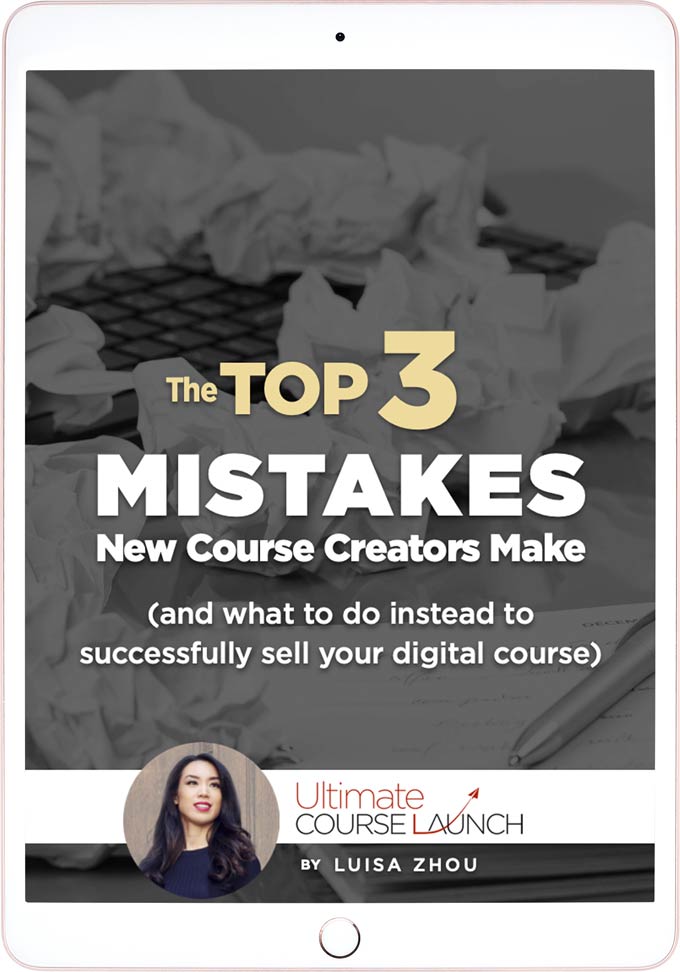If you want to make money teaching online, you’ll really enjoy this guide.
In this article, we’ll talk about the different ways to teach online, the benefits of teaching online, how to get started, and how much you can earn.
Sound good? Read on.
The top ways to teach online
There are many ways to make money teaching online.
The main ones are:
- Selling online courses
- Coaching or consulting
- Creating educational resources
- Online tutoring
- Teaching English (or other languages) online
Let’s talk about each of them in detail.
Sell online courses
An online course is a training program delivered completely online. And you can create a successful course about anything from photography to entrepreneurship, baking to making tiny houses from scratch.
You can learn more about creating an online course in this video:
It’s simple to get started because there are so many platforms you can use to create your course. You could host it on your own WordPress website, use a course creator like Teachable, or try a course marketplace like Skillshare.
Whatever method you choose, selling online courses can be highly profitable and scalable.
Income potential: Six to seven figures
Pros:
- You can set your own prices
- Simple to get started
Cons:
- It takes time to build an audience and make your first sales
- There’s more work to do upfront
Coach or consult online
Discover the top 3 reasons most courses fail
(plus how to fix them so you succeed)
Coaching or consulting is a great place to start teaching online.
Why? Because it’s profitable, flexible, and easy to start.
You can make money teaching topics you already have experience in. That could be from your day job, your personal experience, or your hobbies.
For example, one of my students, Adunola Adeshola from employeeREDEFINED, climbed the corporate ladder to an executive level, only to realize she wasn’t happy. Now she helps mid-executive level women find their dream roles. So she is coaching from her personal experience.
Income potential: Six or seven figures
Pros:
- Can be highly profitable
- You can set your own hours
Cons:
- Not as scalable as courses
- You need expertise in a specific niche
Create educational resources
Another way to make money teaching online is to sell educational digital products.
By digital products, I mean PDF guides, eBooks, workbooks, workshops, webinars, and so on.
These educational resources are great because you only have to put in the work of creating them once. You can sell them indefinitely.
Income potential: Five figures. Six figures are possible but rare.
Pros:
- Upfront costs are low so educational resources are high in profit
- Digital products generate passive income
Cons:
- Tend to be priced low so not as profitable as courses
- It takes time to build an audience to sell large volumes
Tutor online
Think you could help students with their studies? Why not try tutoring online?
With platforms like TutorMe, you can tutor students of all ages on their school subjects and earn for each session you do.
The platform will help you find students to tutor. And if you’re good, you could get regular clients and get paid a weekly side income.
Income potential: Up to five figures
Pros:
- You can set your own schedule
- Highly rewarding work
Cons:
- If you tutor for an online company, you can’t set your own rates
- Work can be sporadic depending on your subject
Teach English online
The most common way of tutoring online is to teach English.
Why? Because there are 1.5 billion English language learners in the world.
As there is so much demand for English tutors, you can find quite regular work online. You could either create your own website to advertise your own services. Or sign up for platforms like iTalki, Preply, or Lingoda. On average, these platforms will pay you $10-20 per hour.
Income potential: Five figures.
Pros:
- Easy to get started
- Can provide a steady side income
Cons:
- Might require an English language qualification like TEFL
- If you’re using an ESL platform, you can’t set your own prices
Next up: why you should teach online.
Benefits of teaching online
So now you know the different ways you can make money teaching online, is it right for you?
Well, here are the benefits:
- Flexibility and freedom: It’s easy to fit teaching online around your schedule. Whether that’s by creating a digital product like a course or signing up for an online tutoring platform, you’re in control of when you work and where.
- Easy to start: Because you’re using the knowledge you already have, you can start teaching online straight away. With tutoring, there may be an application step to pass, but once you’re approved, you can start earning within a couple of days.
- Profitability: Now not all of the methods for teaching online earn the same. But with online courses and coaching, you can create a highly profitable business with low upfront costs and high returns.
- “Passive” income: Let’s be clear – there’s no such thing as truly passive income. But courses and digital products are the closest. You can make unlimited sales on products you’ve already created without too much effort.
- Scalable: Once you have a good sales funnel in place, selling educational resources and courses is highly scalable. This applies less to tutoring and coaching as you can only teach so many people simultaneously.
- Rewarding: Lastly, you can have a huge impact on many people’s lives by teaching online. Whether you’re teaching a 12-year-old English or a career-changer how to find their dream job, you’re changing someone’s life for the better.
In the next section, we’ll talk about exactly how you can start teaching online.
How to make money teaching online
Discover the top 3 reasons most courses fail
(plus how to fix them so you succeed)
Here’s how to get started making money teaching online.
Decide what you want to teach
Can any topic make money?
Yes and no. Let me explain.
Any niche can be successful in theory. From playing the guitar to creating a social media schedule – there’s always someone who wants to learn the skills you have.
But here’s the thing: as the online teaching industry grows, the market becomes more saturated.
To figure out a topic that helps you stand out first figure out the unique skills you have.
For example, if you’ve been a practicing pediatric nurse for years, you could tutor new moms on baby health. Or you could create a course for other nurses teaching them how to find work-life balance.
Which brings me to my next point:
Who do you want to serve?
Your niche is a combination of what you want to teach and who you want to teach.
I talk more about finding your niche in this video:
Now you have a course idea, will it sell? Let’s find out.
Conduct market research
Once you know who your ideal student is, you need to understand them.
Audience or demographic research is how you actually find out if your topic will sell.
My advice is to start online. Use Reddit forums and other social media groups in your niche to see the common questions people are asking.
You could also create your own social media accounts to interact with your audience. Ask them questions in your posts or direct message new followers to see what they want to learn about your niche.
If you’re creating a course, it helps to see what other courses are selling in your niche too. So you can create a fresh product that stands out from the others.
Want to get even more detailed research? Why not coach or consult a few private clients?
That way you get one-on-one time with members of your audience and can see the common problems they face.
Acquire the necessary skills
So let’s say you want to teach English or tutor medical students. You’re probably going to sign up to an existing education platform to find your students.
Some platforms require certifications, relevant degrees, or teaching experience to host you on their platform. Check you fit all of those requirements before you apply.
Do you need a certification to create an online course or start coaching?
Generally no. These are great ways of making money by teaching skills you already have. That means no extra school or teaching qualifications.
But it depends on the topic.
For example, if you want to become a health coach and create courses about health, you probably should have a certification or a background in healthcare. This also helps build trust with your audience.
Overall, you should be teaching a subject you know really well before you start selling your products or services. That could be because of your day job or your personal experience.
And:
If you don’t have the skills yet for the topic you want to teach, spend time becoming an expert first. You can do that with a certification or self-study until you feel confident teaching others.
Create your online course
Let’s talk about how to create an online course (though this could also apply to lesson or coaching programs.)
The first step is to identify the main goal of your program.
Every course or program has a promised result or transformation. That’s what makes the student want to work with you.
For example, if you’re a relationship expert, your program’s goal might be to help your students find love. Or even smaller than that – to figure out the type of person they are looking for so they can find love.
Now you have your end goal in mind, think about the step-by-step process to get there.
Each milestone becomes a module in your curriculum. And you can break each module into 4-7 lessons. That’s enough to be easy to work through either with you or on their own.
By the end, your outline should have:
- Course/program name
- Course/program description
- Modules
- Lessons
- Bonuses
Now let’s talk about format.
If you choose to create a course, I’ll let you in on a secret:
The format doesn’t really matter. The content is the most important thing.
You can use video, photos, graphics, PDF workbooks, templates, emails – or a combination of all of them.
Most high-ticket courses are video lessons with PDF extras.
Focus on creating lessons that are easy to understand and contain actionable steps for your students to help them achieve their goals.
Speaking of students, let’s talk about how to connect with them.
Connect with your target audience
Discover the top 3 reasons most courses fail
(plus how to fix them so you succeed)
You need to build a relationship with your target audience. That way, they are more likely to trust your guidance and buy your teaching products.
How do you build those relationships?
Simple: give value first.
That could mean different things depending on your audience. For me, it means creating YouTube videos about how to start an online business and writing daily (weekday) email newsletters. These two things help my audience get to know me and my work.
So when you’re starting out, use social media to get in front of your audience and share as much free content as consistently as you can.
Another great strategy is to guest post on podcasts in your niche. This helps boost your visibility with potential students and helps them understand your brand.
Now followers on your social media accounts can be great. But there’s a word for metrics like your follower count: vanity metrics.
Your success depends on more than how many followers you have on Instagram. What’s important is if you can convert those followers into customers.
To do that, I recommend you create an email list for people to subscribe to. An email list gives you closer access to your followers so you can build a closer relationship and give value differently.
When the time comes, email subscribers are way more likely to buy your course or sign up for coaching.
So start with social media and then funnel them to your email list.
Let’s talk more about social media strategy.
Build your online presence
Social media platforms are all different.
Each one has a target audience. And you need to figure out where your target audience hangs out.
Think about:
- Your industry
- Your audience’s age range
For example, if you’re starting a tutoring business for high-school students, TikTok could be a great fit for your brand.
On the other hand, a career coach for mid–level career changers should probably be posting on LinkedIn consistently to find their audience.
But here’s the key: Focus on one channel first.
I know there’s pressure to be everywhere at once, but honestly, it’s just overwhelming.
Focusing on learning one platform well gives you a better chance at nurturing your audience. You’ll also understand what content works and what doesn’t.
Once you’ve started posting on your chosen platform, create a content strategy you can stick to. That means posting every day for most platforms.
But if you can only post every other day, that’s okay too.
What matters is you’re showing up consistently, answering questions in the comments, engaging with others in your niche, and building an approachable, knowledgeable brand.
You can use your chosen platform to sell your course or teaching services as you build your audience. So don’t think you need to already have a huge audience to make this work. You can build and sell at the same time.
Improve your product
So you’ve sold your course or coaching program – what’s next?
To me, the real work begins. To make your course or program the best it can be, you need to keep improving it.
Why? Well, if your audience is spending hundreds or thousands on your products, you want it to be the best experience it can be.
So how do you improve? The best way is to tweak based on customer feedback.
Now, this could take time. It took me 2-3 years to perfect my flagship course, Employee to Entrepreneur. But it was so worth it. That course is still a bestseller and brings in multiple six figures every year.
The key? Obsess over providing the most value you can. Overdeliver and engage with your audience to learn what’s working and what’s not.
Many people will give you positive feedback if they are enjoying your course or program. That’s great because testimonials will help you sell your products in the future. However, I recommend contacting students directly to ask some more targeted questions.
Here are some examples:
- What do you like about the course?
- What are the areas I can improve?
- Would you recommend the course to your friends, family, or colleagues? Why or why not?
- What transformation did you get from taking the course?
- What were your results from taking the course?
These answers are invaluable to building a better product that continues to sell.
Build your resilience
So those are the more practical elements of teaching online.
But I want to talk about mindset for a minute.
The truth is making money teaching online can take time. You won’t build your business overnight. And no matter what any “guru” tells you, creating courses is not a fast track to getting rich.
It takes hard work and persistence to create, market, and sell educational resources and services that can sustain your business.
It’s all about having an entrepreneurial mindset.
That means:
- Setting realistic goals: Don’t expect that you’ll reach six figures with your first course launch. You’ll probably be disappointed. For context, I made $8,000 with my first course launch which is pretty good. So keep your numbers in check.
- Schedule when you’ll work on your business: “Booking” time in your calendar to work on your online teaching business will help make sure important tasks get done.
- Switch your negativity bias: Negativity bias is the very human tendency to focus on the negative. So next time something isn’t working, change “Why isn’t this working?” to “How can I make this work?”
Just these three mindset shifts will go a long way.
But you can read more about developing an entrepreneurial mindset in this blog post.
How much money can you make teaching online?
The amount you could earn teaching online depends on two things:
- The topic you’re teaching
- The type of teaching you’re doing
- The platform you’re using to teach
For example, if you teach English for an online teaching company, you can make between $10-20 per hour. Most online teaching companies have set rates and minimum working hours so you have less flexibility on how much you can earn.
According to Glassdoor, online ESL (English as a Second Language) teachers make an average of $51,360 per year.
Compare that to selling an online course on a topic you’re passionate about. Selling three flagship $2,000 courses every month makes $72,000 per year. And because courses are digital products, you don’t have to spend as much time selling them as you would tutoring English one-on-one.
But if you prefer one-on-one work, coaching or consulting gives you way more flexibility in how much you can earn.
Discover the top 3 reasons most courses fail
(plus how to fix them so you succeed)
A coach can earn $100 to $500+ per hour depending on their reputation, expertise, and target audience. Life coaches make on average $69,980 per year. But because you can set your own rates, you could make six figures or even seven figures as a successful coach.
Bottom line: How much you can make teaching online depends on you.
If you want to start making income faster, teaching for an online company is a good place to start. But if you want to reach multiple six figures in revenue, coaching or courses are better paths.
Next step
And that’s how you make money teaching online!
For most people, I recommend starting an online course business. It’s profitable, scalable, and gives you so much flexibility and freedom.
But there are many mistakes that course creators make in the beginning that can impact their success.
Want to know what they are?
Download my free guide on the top three most common mistakes course creators make (and how to avoid them.)
Read more:
Online Teaching Platforms: The Ultimate List for Course Sales
How to Start an Online Course Business
The Most Profitable Digital Products To Sell









